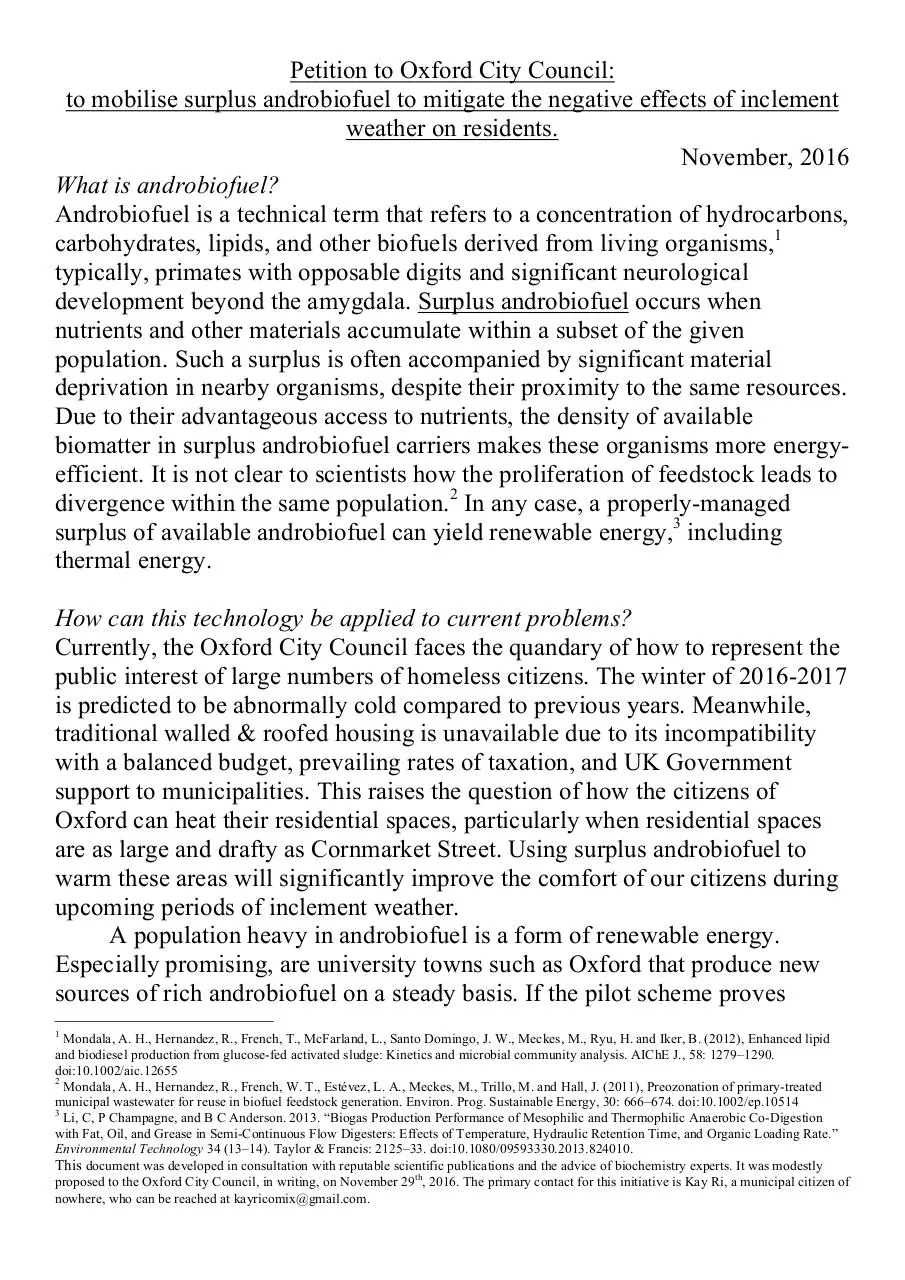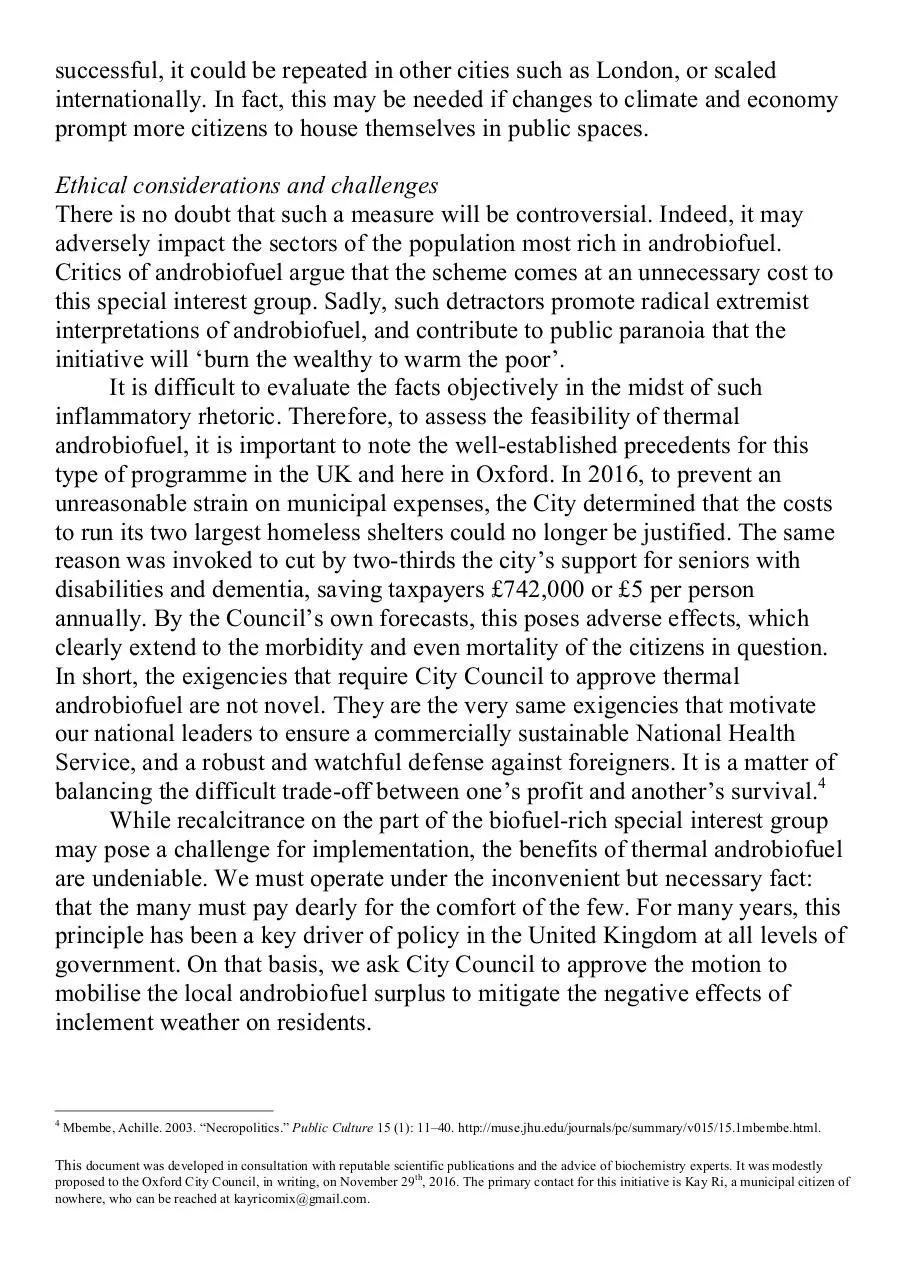Motion to Oxford City Council large font (PDF)
File information
Title: Microsoft Word - Motion to Oxford City Council.docx
This PDF 1.3 document has been generated by Word / Mac OS X 10.12 Quartz PDFContext, and has been sent on pdf-archive.com on 30/11/2016 at 19:43, from IP address 212.74.x.x.
The current document download page has been viewed 117 times.
File size: 84.29 KB (2 pages).
Privacy: public file


File preview
Petition to Oxford City Council:
to mobilise surplus androbiofuel to mitigate the negative effects of inclement
weather on residents.
November, 2016
What is androbiofuel?
Androbiofuel is a technical term that refers to a concentration of hydrocarbons,
carbohydrates, lipids, and other biofuels derived from living organisms,1
typically, primates with opposable digits and significant neurological
development beyond the amygdala. Surplus androbiofuel occurs when
nutrients and other materials accumulate within a subset of the given
population. Such a surplus is often accompanied by significant material
deprivation in nearby organisms, despite their proximity to the same resources.
Due to their advantageous access to nutrients, the density of available
biomatter in surplus androbiofuel carriers makes these organisms more energyefficient. It is not clear to scientists how the proliferation of feedstock leads to
divergence within the same population.2 In any case, a properly-managed
surplus of available androbiofuel can yield renewable energy,3 including
thermal energy.
How can this technology be applied to current problems?
Currently, the Oxford City Council faces the quandary of how to represent the
public interest of large numbers of homeless citizens. The winter of 2016-2017
is predicted to be abnormally cold compared to previous years. Meanwhile,
traditional walled & roofed housing is unavailable due to its incompatibility
with a balanced budget, prevailing rates of taxation, and UK Government
support to municipalities. This raises the question of how the citizens of
Oxford can heat their residential spaces, particularly when residential spaces
are as large and drafty as Cornmarket Street. Using surplus androbiofuel to
warm these areas will significantly improve the comfort of our citizens during
upcoming periods of inclement weather.
A population heavy in androbiofuel is a form of renewable energy.
Especially promising, are university towns such as Oxford that produce new
sources of rich androbiofuel on a steady basis. If the pilot scheme proves
1
Mondala, A. H., Hernandez, R., French, T., McFarland, L., Santo Domingo, J. W., Meckes, M., Ryu, H. and Iker, B. (2012), Enhanced lipid
and biodiesel production from glucose-fed activated sludge: Kinetics and microbial community analysis. AIChE J., 58: 1279–1290.
doi:10.1002/aic.12655
2
Mondala, A. H., Hernandez, R., French, W. T., Estévez, L. A., Meckes, M., Trillo, M. and Hall, J. (2011), Preozonation of primary-treated
municipal wastewater for reuse in biofuel feedstock generation. Environ. Prog. Sustainable Energy, 30: 666–674. doi:10.1002/ep.10514
3
Li, C, P Champagne, and B C Anderson. 2013. “Biogas Production Performance of Mesophilic and Thermophilic Anaerobic Co-Digestion
with Fat, Oil, and Grease in Semi-Continuous Flow Digesters: Effects of Temperature, Hydraulic Retention Time, and Organic Loading Rate.”
Environmental Technology 34 (13–14). Taylor & Francis: 2125–33. doi:10.1080/09593330.2013.824010.
This document was developed in consultation with reputable scientific publications and the advice of biochemistry experts. It was modestly
proposed to the Oxford City Council, in writing, on November 29th, 2016. The primary contact for this initiative is Kay Ri, a municipal citizen of
nowhere, who can be reached at kayricomix@gmail.com.
successful, it could be repeated in other cities such as London, or scaled
internationally. In fact, this may be needed if changes to climate and economy
prompt more citizens to house themselves in public spaces.
Ethical considerations and challenges
There is no doubt that such a measure will be controversial. Indeed, it may
adversely impact the sectors of the population most rich in androbiofuel.
Critics of androbiofuel argue that the scheme comes at an unnecessary cost to
this special interest group. Sadly, such detractors promote radical extremist
interpretations of androbiofuel, and contribute to public paranoia that the
initiative will ‘burn the wealthy to warm the poor’.
It is difficult to evaluate the facts objectively in the midst of such
inflammatory rhetoric. Therefore, to assess the feasibility of thermal
androbiofuel, it is important to note the well-established precedents for this
type of programme in the UK and here in Oxford. In 2016, to prevent an
unreasonable strain on municipal expenses, the City determined that the costs
to run its two largest homeless shelters could no longer be justified. The same
reason was invoked to cut by two-thirds the city’s support for seniors with
disabilities and dementia, saving taxpayers £742,000 or £5 per person
annually. By the Council’s own forecasts, this poses adverse effects, which
clearly extend to the morbidity and even mortality of the citizens in question.
In short, the exigencies that require City Council to approve thermal
androbiofuel are not novel. They are the very same exigencies that motivate
our national leaders to ensure a commercially sustainable National Health
Service, and a robust and watchful defense against foreigners. It is a matter of
balancing the difficult trade-off between one’s profit and another’s survival.4
While recalcitrance on the part of the biofuel-rich special interest group
may pose a challenge for implementation, the benefits of thermal androbiofuel
are undeniable. We must operate under the inconvenient but necessary fact:
that the many must pay dearly for the comfort of the few. For many years, this
principle has been a key driver of policy in the United Kingdom at all levels of
government. On that basis, we ask City Council to approve the motion to
mobilise the local androbiofuel surplus to mitigate the negative effects of
inclement weather on residents.
4
Mbembe, Achille. 2003. “Necropolitics.” Public Culture 15 (1): 11–40. http://muse.jhu.edu/journals/pc/summary/v015/15.1mbembe.html.
This document was developed in consultation with reputable scientific publications and the advice of biochemistry experts. It was modestly
proposed to the Oxford City Council, in writing, on November 29th, 2016. The primary contact for this initiative is Kay Ri, a municipal citizen of
nowhere, who can be reached at kayricomix@gmail.com.
Download Motion to Oxford City Council large font
Motion to Oxford City Council large font.pdf (PDF, 84.29 KB)
Download PDF
Share this file on social networks
Link to this page
Permanent link
Use the permanent link to the download page to share your document on Facebook, Twitter, LinkedIn, or directly with a contact by e-Mail, Messenger, Whatsapp, Line..
Short link
Use the short link to share your document on Twitter or by text message (SMS)
HTML Code
Copy the following HTML code to share your document on a Website or Blog
QR Code to this page

This file has been shared publicly by a user of PDF Archive.
Document ID: 0000515168.